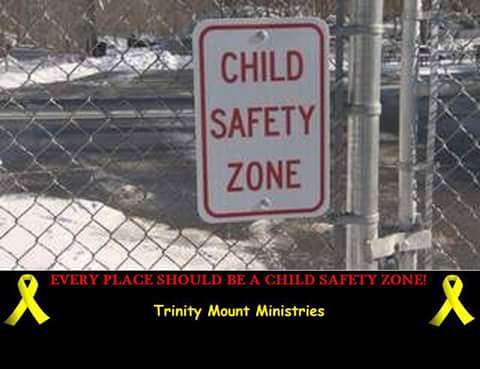In the end, such posts usually blamed the current law for being too lenient on child traffickers, and called to raise the current minimum imprisonment of five years.
"Prescribing death for every trafficker may lead to more extreme cases of child trafficking."
As of Thursday night, more than 540,000 people have expressed agreement with a proposal that demands death for all child traffickers, by forwarding it on Wechat.
There were no official statistics about human trafficking in China. The frequent media reports on police raids on child trafficking gangs, and the universal notices for missing children on lamp posts and on the Internet imply that it is prevalent. The rapid spread of the post on social media reflects the fact that it echoes people's long-held concerns.
Facing public pressure, Chinese law professors are voicing their opinions on all online platforms and media they can access, with some suggesting web users not to be taken in by some public pages that are just attracting hits.
Zhang Hui, a lawyer from Guangzhou, said among fundamental principles of law, one is, a violator's punishment should be suited to the crime he or she committed, and another is the presumption of innocence. The uniform punishment certainly violates these rules. They would also deprive the criminal of his right to defend himself.
Hopeful: a father holds a placard looking for his missing son in Shantou
Qi Xiaoling, a law professor, said prescribing death for every trafficker may lead to more extreme cases. If the trafficker would face a death sentence no matter whether he abducted one child or 100 children, he might go for the latter, which is more lucrative. Besides, the capital punishment will increase the possibility that the trafficker turns to extreme approaches once exposed – such as killing the kidnapped child, to prevent police from finding the evidence of his crime.
Li Xuesong, judge of Qujing Intermediate People's Court, admitted that the current law imposes light punishment on buyers of abducted children. According to the Criminal Law of China: "Whoever buys a child but does not maltreat the child nor obstruct his or her rescue may be exempted from being investigated for criminal responsibility." Li suggested a change to this article that imposes a heavier penalty on buyers of an abducted child.
According to China's criminal law, whoever abducts and traffics a child shall be sentenced to at least five years in prison. Under eight aggravating circumstances, including trafficking more than three persons, sexual abuse, and use of violent means, the trafficker shall be sentenced to more than 10 years, up to life imprisonment. If the circumstances are especially serious, he/she shall be sentenced to death and also to confiscation of property.
"Whoever abducts and traffics a child shall be sentenced to at least five years in prison."
In fact, China has kept a heavy punishment for children trafficking. Official figures show that courts across the country handled over 7,700 such cases between 2010 and 2014. Some 13,000 people were punished and over 7,000 of them were given sentences greater than five years in prison.
And the death sentence, which netizens have called for, has never been ruled out.
Lan Shushan, who abducted 34 children aged from 3 to 10 and sold them for over 500,000 yuan (about $81,334) from 1998 to 2008, was sentenced to death earlier this year.
In another case, Ma Shouqing and his accomplices abducted and sold 37 children from 2006 to 2008, with one female infant dying during transportation. He got the same punishment as Lan and was executed.
How do other countries fight against child abduction?
US
In the US, an 'Amber Alert' rapid response system has been established to tackle such crimes with profiles of a missing child publicized through various channels: TV, radio, text messages, Facebook, Twitter, website pop ups and banners and large screens in public places. Besides, America has established a National Center of Missing and Exploited Children, for parents of those children to report their missing children and issue a standard notice. Parents can also request the center to send a specialized search party to look for the child.
Japan
Japan has less than 100 cases of child kidnapping each year. This can be attributed to the equivalent punishment between kidnapping and illegal adoption. Under Japan's criminal law, both of them would receive similar terms of imprisonment- less than ten years for kidnapping and seven years for illegal adoption.
EU
On Dec 29, 2010, the European Council and European Parliament agreed to make a new law on combating kidnapping to fight against such behavior more strictly. The new law gives a broader definition to kidnapping, including
forced begging and kidnapping with the aim of illegal adoption. The new law imposes imprisonment from five years to ten years on criminals in kidnap cases, focusing on enslaving children, organized crime, threatening victims' lives and severe violence. Suspected individuals and corporations may face criminal punishment and temporary or permanent closure.
Thailand
Kidnapping is prevalent in Thailand. Most of the children kidnapped are forced to beg or sold to factories as cheap labor. To fight against it, the Thai government combines legislation and prevention. It established a strict labor policy, stating that foreigners need work permits in order to work in Thailand, or both the employer and employee will receive criminal punishment. Besides, numerous civil organizations participate in the cause, promoting education for women and children and protecting their rights.
Infographic: abducted child rescued after 42 hours of fear
Why is child trafficking rampant in China?
It is believed the tradition of preferring boys over girls and legal loopholes has led to a strong demand from "buyers".
China has advocated a one-child policy since the 1970s, aiming to deter people persistently having children in an attempt to get a male offspring to continue the family line.
In some regions, especially the rural southwest, people are willing to go far to get a boy so that their family lines will "survive".
Another contributing factor has been the mild legal consequences of purchasing abducted children. According to Chinese law, "buyers" shall be exempt from criminal liability if they have not ill-treated or impeded the rescue of trafficked children.
Chen Shiqu, director of the anti-trafficking office, Ministry of Public Security, believes it "is hard to stop buyers".
"We are stepping up efforts to get punishment of buyers into law. We also want to change the way rescued children are treated. When they are taken from a buyer they will be sent to social welfare institutes," the People's Daily quoted Chen as saying.
 Accused: 24 defendants suspected of trafficking babies hear trials at a court
Accused: 24 defendants suspected of trafficking babies hear trials at a court
Adoption also has a role to play.
According to Xu Jianzhong, a senior official at the Ministry of Civil Affairs, about 30,000 children are currently living with foster families across the country and latest figures from the ministry show the number of registered orphans to be about 600,000.
Qin Xiyan, a lawyer from Central China's Hunan province, submitted a proposal to amend the adoption law a few years ago.
The proposal pointed out some parts of the law, implemented in 1992, were outdated, with high qualifications set for foster family applicants, deficient adoption procedures and lack of supervision. Legal loopholes encourage underground adoption and child-trafficking.
In an encouraging sign, a new regulation on foster families was issued on Sept 26. It is expected to help state-certified families adopt orphans and homeless children, Xinhua News Agency quoted Xu as saying.
Internet and DNA technology help bring abducted children home
China introduced a DNA information system solely for child-trafficking cases in 2009. It has been used to identify parent-child relationships by comparing samples collected from families of missing children. "(As of October), it has helped find more than 3,500 kidnapped children," Chen Shiqu said.
More efforts have been introduced to save abducted children. On Nov 3, an online platform was launched in Beijing to construct a database for parents, children, the police and the public at large to share related information.
Wu Yan, Liu Jing, Ma Chi and He Shuang contributed to this report.

















